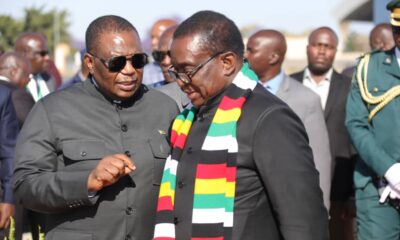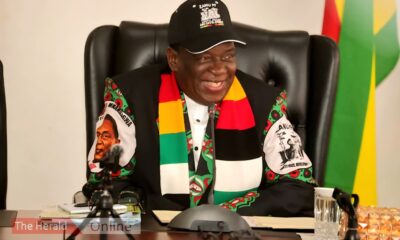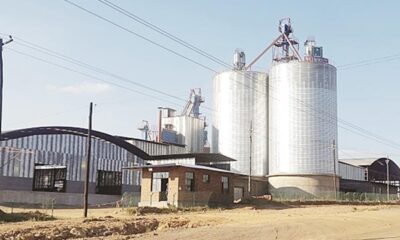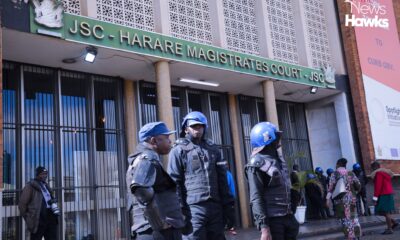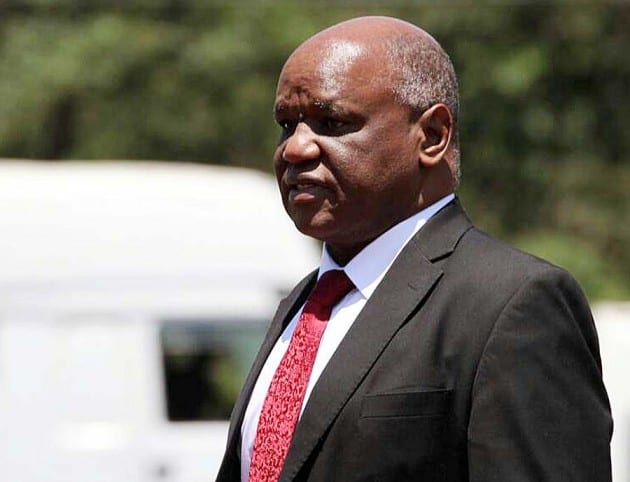
Opinion
Malaba: The litigated chief justice
Published
5 years agoon
By
NewsHawksTERERAI MAFUKIDZE
THIS newspaper has run a series of articles over the last six months analysing the history of appointment of chief justices since colonial days.
What one discerns from history is that the position of head of the judiciary is politically contested terrain. This is more pronounced in post-Independence Zimbabwe. Politicians prefer judicial officers that are unlikely to upend their political power.
They prefer yes-men and yes-women. They prefer what the old Ndebele adults called “oYes Nkosi”. With this political desire in mind, politicians prefer the third arm of government to be placed in the hands of trusted allies. Political tides vary.
In one season, the politician prefers one who will bend the law to suit his or her designs. In another season, the politician would prefer one who does nothing to impede the political class should there be a political controversy. A too political chief justice can be as much a liability as a supine one. Power, when reposed even in a judicial figure, does tend to create its own ambitions.
• As we have seen, Cecil John Rhodes placed the first judicial arm in the hands of his right-hand man Dr Leander Starr Jameson—whom he loved dearly. As I write, they lie in death side by side like Siamese twins on the Matopos hill. Jameson was a medical doctor with no legal training. Yet he understood his role as chief magistrate to be supportive of the colonial enterprise by ensuring law and order.
He hanged Louw Andries, despite doubts on the quality of the evidence against Andries, to make the point amongst settlers. Next, he hanged Zulu Jim to make the point to the conquered natives. 70 years later, Judge Macdonald used the noose to deliver the message to the freedom fighters who dreamt of liberating the African from colonial rule.
• When the time came for the British South Africa Company to appoint the first proper judge to man the newly created High Court in 1894, the company chose an advocate whose father had been a member of the Cape legislature. Judge Joseph Vintcent had served as a crown prosecutor in Botswana. He was a trusted and experienced colonial employee with the “necessary experience” of dealing with company interests and “natives”. It was no surprise that when Jameson was in prison in the Transvaal after the calamitous Jameson Raid of 1895, Judge Vintcent administered the new territory and performed executive, judicial and military roles. He was commander-in-chief suppressing the 1896 Ndebele-Shona rebellion and declared martial law.
• When a second High Court judge was required, the BSA Company appointed Joseph Philip Watermeyer, another Cape advocate. Watermeyer sentenced Nehanda, Kaguvi, Chief Mashonganyika and others to death in 1898 for disrupting the colonial project through the 1896 rebellion. The executions were meant to deliver a message to “natives”.
• When the first two High Court judges died within two weeks of each other in 1914 leaving the country without a judge, the BSA Company called upon Rhodes and Jameson’s old friend, William Musgrave Hopley, to cross from South Africa and hold judicial reins. Amongst other judicial appointments was the appointment of Clarkson Tredgold as a High Court judge. He was the son-in-law of John Moffat, having married John Moffat’s daughter. Senior Tredgold had been a faithful servant of the early colonial administration, holding office as Attorney-General.
• The first person to hold the formal position of chief justice was Murray Bisset in 1927. He was imported from South Africa where he had fought in the Anglo-Boer war and had also been a politician, cricketer and practising advocate. Bisset was replaced on his death by another South African import, Alexander Fraser Rusell. Fraser Rusell was followed in office by Robert Hudson. Hudson had been minister of Justice and Attorney-General and also minister of Defence. He crossed from the executive to the bench. He was a veteran of the First World War.
• Hudson was followed by Vernon Lewis who had the shortest stint as chief justice. He died within seven days of appointment. Lewis was the son-in-law of Dr Leander Starr Jameson—the first head of the judicial arm in colonial Rhdoesia and Rhodes’s best friend. He was married to Jameson’s daughter. Lewis had been Minister of Justice and Defence before he went to the bench. Lewis was followed by Robert Tredgold, the son of Clarkson and grandson of John Moffat and great grandson of Robert Moffat. John Moffat’s grandson Howard Unwin Moffat had been Southern Rhodesia’s second prime minister of self-government, succeeding Charles Coghlan.
• The junior Tredgold had had a political career before appointment to the bench. He had served as a parliamentarian and in a few cabinet positions, including that of minister of Justice and Defence. When Tredgold was elevated to the position of chief justice of the Federation of Rhodesia and Nyasaland, Garfield Todd’s Southern Rhodesian government imported judge John Murray from South Africa to be chief justice.Murray was appointed ahead of a qualified sitting Rhodesian judge.
It is believed that the Rhodesian judge, Ralph Morton, was bypassed on account of lenient sentences imposed on white farmers who had assaulted their black labourers. This would naturally have upset Todd who was a liberal and believed in uplifting the standards of blacks. Murray was offered the job despite being 67—two years above retirement age at the time. He retired at 73. He was the oldest person to hold the position of chief justice.
• Murray was followed by Hugh Beadle. He again was an accomplished politician, served in the Second World War, had been a parliamentarian, senior civil servant and cabinet minister responsible for Justice, Internal Affairs, Law and Order, etc. Beadle, while minister of Justice, appointed himself a High Court judge. He was subsequently appointed chief justice. He deployed his political skills on the bench and was described by Chief Justice Dumbutshena as more a right wing politician than a judge. Beadle was replaced by Hector “Hanging” Macdonald.
Macdonald was a diehard racist and backer of the racist Rhodesian Front. He hanged freedom fighters with alacrity.
He misjudged the politics of the late 1970s and declared that should the Patriotic Front (Zanu PF and PF Zapu) win he, together with his appellate court colleagues, would resign. This move ensured he would have to leave office on attaining 65 at Independence.
It also cost his preferred successor, John Lewis, the son of Vernon Lewis, the position of chief justice at Independence. Mugabe would not appoint Lewis in light of the position they adopted towards the Patriotic Front.
Instead, Mugabe appointed John Fieldsend, who had resigned in protest over the hanging of the first three political prisoners in 1968. He was trusted to be fair. Mugabe did not appoint Leo Baron, who had been deputy chief justice in Zambia and had impeccable struggle credentials. It is believed Baron was bypassed because of his closeness to Mugabe’s bitter political rival Joshua Nkomo. Upon his retirement, a Caribbean named Philip Telford Georges, who had served as chief justice in Tanzania, was imported.
• When Georges retired, Mugabe appointed Enoch Dumbutshena, the first black African judge in Zimbabwe, to be chief justice. Dumbutshena had preceded Mugabe in the nationalist movement. He had remained loyal to Joshua Nkomo when Zapu spilt in 1963. Dumbutshena served as chief justice for six years until his retirement in 1990. Mugabe refused to extend his term by a further two years as requested by Justice Gubbay who subsequently succeeded Dumbutshena. Mugabe seemed not to like his independent-mindedness. When Dumbutshena subsequently re-entered politics on retirement and challenged Mugabe’s rule, Mugabe publicly rethorically asked: “HwuChief Justice hwacho akahupuwa nani?” (Did I not give him the Chief Justice position?”
• It appears Gubbay, who had been appointed a judge by Ian Smith in 1977, was only appointed chief justice after Justice Nick McNally had indicated that he was not interested in the position after an informal and casual approach by an attorney. It appears Mugabe would have happily appointed McNally whom he had known from their student days in South Africa.
• Gubbay was surprised by his own appointment. It probably served a purpose for Mugabe. He replaced Dumbutshena, who had turned out to be independent minded with a white judge initially appointed by Smith. Gubbay had defended some of the nationalists as an advocate. Soon after the appointment, Gubbay made a public statement criticising Mugabe’s intended land acquisition legislation. This pronouncement earned him vicious brickbats. By the time the chaotic land reform programme started ten years later, Gubbay was a marked man. He did not last after making decisions that Mugabe did not like regarding land. He was forced out of office before reaching his retirement date.
• In his place, Godfrey Chidyausiku was appointed from the ranks of the High Court, thereby bypassing several senior judges, two of them black. Chidyausiku had been a parliamentarian on the black voters’ roll in Rhodesia. He had served as a deputy minister at Independence before being appointed Attorney General. True to the political mission, Chidyausiku paved the way for Mugabe’s land reform agenda on the Bench. When he found himself in the minority on the Supreme Court bench, Mugabe appointed two High Court judges Mischek Cheda and Luke Malaba on the pretext that there was more workload. The subsequent allocation of seats in political cases followed a discernible pattern. McNally and Sandura were particularly omitted. At his funeral, Mugabe proudly announced that since the appointment of Chidyausiku as chief justice his government had not lost a single case.
• In 2016, when Chidyausiku was about to reach retirement, Emmerson Mnangagwa’s faction tried to prevent an open race for the position of chief justice as required by the Constitution. The 2013 Constitution required the position to be advertised, public interviews and the recommendation of three candidates to the President for appointment. Chidyausiku was sent home on leave pending retirement, apparently without Mugabe’s knowledge. Mnangagwa was one of the two Vice Presidents and also served as the Minister of Justice. Chidyausiku was reportedly returned to office by Mugabe, with the instructions to proceed and find a possible successor.
The litigated chief justiceship
• Malaba’s appointment as Chief Justice became a litigated affair fronted by a law student, Romeo Zibani. It was the first time in the history of the country that the appointment became a litigated affair.
On 11 December 2016, Judge Hungwe interdicted the Judicial Service Commission from conducting interviews which had been set for 12 December to choose the three names to be recommended to President Mugabe as replacement of Chidyausiku. Zibani approached the High Court arguing that since the candidates were known to the JSC members, a committee of retired judges should instead conduct the interviews and recommend the next chief justice.
In response to the application, Mnangagwa curiously attached a draft Constitutional Bill which he stated was to be presented to Parliament to amend the procedure set in the Constitution. It would give power to the President to appoint the Chief Justice, Deputy Chief Justice and Judge President of the High Court without the open and public contestation required by the 2013 Constitution. The judgment of the High Court departed from the case brought by Zibani and interdicted the interviews pending Mnangagwa’s Bill being presented and promulgated by Parliament.
• The JSC immediately appealed to the Supreme Court suspending the High Court interdict. The interviews went ahead. Of the initial four candidates only three, DCJ Malaba, Justices Makarau and Garwe turned up. Judge President Chiweshe did not turn up for his interview.
The leaked results of the interviews showed that the real contest was between Malaba and Makarau, with Garwe placed a distant third. The Supreme Court subsequently heard the appeal on an urgent basis and overturned the High Court decision.
Behind the scenes, there were damaging rumours about political interference in the litigation. Chidyausiku in fact struggled to put together a five judge panel he had intended to hear the matter. He ended up calling up one retired judge to complete a panel of three. Mugabe went on to appoint Malaba as Chief Justice to replace Chidyausiku. It was the first time that ascendancy to the position was preceded by litigation.
• This appears to have been a bad omen. Litigation, which ushered the chief justiceship of Luke Malaba, has returned to haunt his extension of term from retirement at 70 years to retirement at 75 years. Despite initially being opposed to Malaba’s appointment in 2016, Mnangagwa’s faction seems to have warmed up to Chief Justice Malaba. The government presented the Constitutional Amendment No.2 to extend the term of office of the Chief Justice, Constitutional Court and Supreme Court judges to a retirement age of 75. The 2013 Constitution set this at 70. The effect of the amendment is that instead of retiring in 2021, Malaba would be due for retirement in 2026 at the age of 75.
• Litigation was instituted in the High Court to declare the extension inapplicable to Malaba. Three judges of the High Court declared that this extension did not apply to Malaba. All judges of the Supreme Court were cited in the litigation. The JSC and the judges have appealed to the Supreme Court. The appeal is yet to be heard.
• From the blind side, a litigant named Marx Mupungu applied to the Constitutional Court to hear the matter on the basis that the effect of the High Court decision was that the President had failed to fulfil a constitutional obligation in extending Malaba’s term of office. This constitutional application was given priority and has already been heard. Mupungu deliberately did not cite the judges cited in the High Court matter. At the hearing, one of the parties, Musa Kika applied to have the judges recuse themselves. The application was dismissed. The reasons for dismissing the application will be given by the Court later.
• Kika then withdrew from participating in the hearing on the merits. The Young Lawyers Association participated in the hearing on the merits. The Court appointed its own amicus curiae, that is, a friend of the court, to present argument. Judgment has been reserved. Litigation brought by other individuals and organisations challenging the constitutionality of the two amendments to the Constitution before the Constitutional Court is pending. It has not been given the priority given to the other matter.
• After the High Court declarator, it appeared Malaba was unsure of his own position. The JSC announced that DCJ Gwaunza would be the acting Chief Justice. She indeed performed some of the tasks. However, silently, Malaba returned to the office and performed some of his ceremonial roles, like swearing in new judges.
• Recently, new Supreme Court judges and the Judge President appear to have been appointed despite the pending challenge to the constitutional amendments which, if successful, would render the appointments invalid.
An organisation such as the JSC should have deferred any appointments until the litigation over the enabling legislation is finalised. That would enhance the rule of law. To go ahead in the face of legal challenges is damaging. Does the JSC believe that the result is guaranteed?
Damage to public confidence in the judiciary
• Whatever judicially pronounced outcome will be made regarding this judicial saga, the biggest casualty is public confidence in the judiciary, and the damage done to it will endure for years to come. The importance of an independent and accountable judiciary in our constitutional democracy cannot be debated. Once public confidence perishes, the observance of the rule of law will be in jeopardy. Before Malaba’s ascendancy to the position of chief justice, our country had been preceded by 17 years of unrelenting assault on the rule of law.
• Our Constitution vests the judicial authority in the courts. They are entrusted with far reaching powers. These powers are essential to the protection of our constitutional democracy. Public confidence is of the highest importance. As US Supreme Court Justice Felix Frankfurter once said, “The court’s authority – possessed of neither the purse nor the sword – ultimately rests on sustained public confidence in its moral sanction.” Courts make decisions which affect the liberty, property and dignity of individuals.
These decisions are accepted by society because its members believe that they have been made honestly, impartially and independent of any external pressures. When one torpedoes that confidence, there can be no faith in the rule of law. Courts and judges must not only be independent and effective, they are also required to be seen as independent and effective. With justice and judges, perception is as powerful as reality.
No wonder there is the oft-quoted aphorism: justice must not only be done, but also be seen to be done. Public confidence in the courts is based on perceptions of the justness of judicial decisions, the efficacy of the court system, and the integrity of judges
• On Wednesday 11 August 2021, the South African President Cyril Ramaphosa appeared before the Zondo Commission into State Capture. He shocked the nation by admitting that the ruling African National Congress’s cadre deployment committee discusses which judges should be appointed to which courts and positions. This is patently unconstitutional.
This revelation may have shocked those who believed that South Africa was exemplary in terms of protecting the courts from political influence. It is not. The ruling party, like others across the continent, has a vested interest in ensuring that courts are manned by cadres. Unless we collectively arrest it, our politicians will forever seek to control the third arm of the State.
• When personal and political ambition have long dissipated, we shall look back and wonder whether this assault on a freshly minted democratic constitution was at all necessary. Without independent judges and courts our rights and democracy are in peril. — Tererai R Mafukidze ©
You may like



